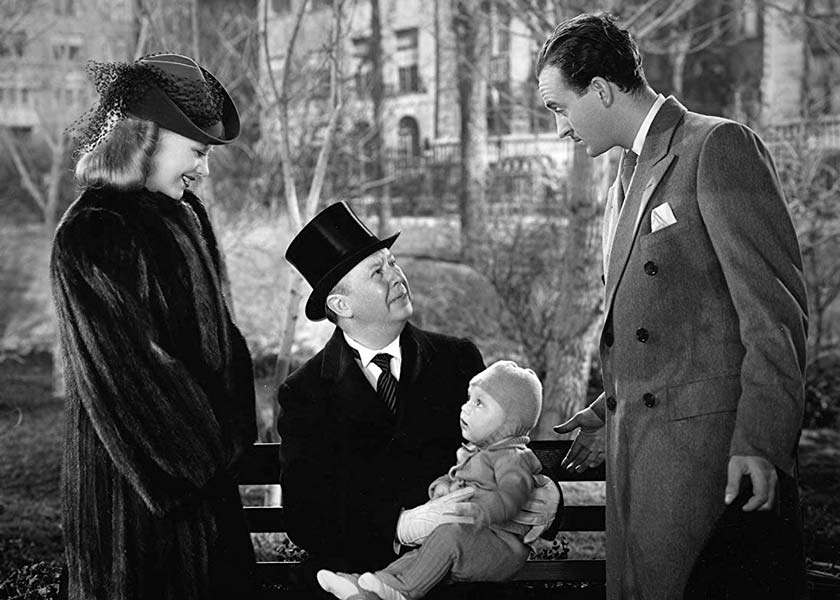Synopsis
Polly Parrish (Rogers) attempts to stop a woman from abandoning her baby on the steps of a foundling home. As Polly stoops over the child, the attendants of the home come out and mistake her for the mother. The well-meaning attendants insist that Polly keep the baby, but she leaves without him. The attendants find the department store where Polly works and come to demand that she take back the baby. David Merlin (Niven), son of the store's owner, insists that she keep the baby and, to help her out, raises her salary. Reluctantly, Polly takes the baby home.
Polly's male co-workers have varying responses to the baby, but they all believe the child is Polly's. Freddie Miller (Albertson), a co–worker interested in Polly, initially is floored by the news and then frightened to be suspected as the father. David is sympathetic and brings the baby gifts. Mother instinct slowly overwhelms her, and Polly accepts the child as her own. David, attracted to her, realizes she is a fine young woman. J.B. Merlin (Coburn), David's father, finds out that his son has visited Polly and the baby and decides the child must be his grandson. J.B. wants a grandchild and refuses to believe that the child is not David's. He threatens legal action to take the baby. Polly and David acknowledge their love, let J.B. believe he is a grandfather, and plan to wed.
Discussion
Ginger Rogers is appealing and sympathetic as Polly Parrish, a working woman with a baby suddenly put into her care. David Niven, handsome and charming, displays his cultured voice and relaxed demeanor. Charles Coburn provides able comic support and is very funny in the scene when he recognizes a family trait on the child. He is bound and determined that the baby is his grandson nothing will dissuade him.
After the baby is thrust upon her and she accepts him, Polly has two main difficulties: the expense of his care and the social stigma of unwed motherhood. A good marriage is the best solution to these problems and the ideal husband soon appears in the person of her boss, David, who is sympathetic, handsome, and rich. The plot thereafter focuses on getting the main characters together with the unusual twist that they accept, as their child, a baby who is not theirs. The addition of a prospective grandfather who insists that the baby is his grandson drives the outcome. In the end it all works out, and Polly gets a worthy, rich man for herself and her adopted child. In a nice touch, the stigma of unwed parenthood is applied to men as well as women: Frank Albertson’s character is horrified by the prospect of illicit fatherhood and responsibility for the child.
Films depicting unwed mothers and illegitimate children, such as Bachelor Mother and Her Sister's Secret (1946), would have had great difficulty navigating the restrictions of Motion Picture Production Code, strictly enforced by the Motion Picture Producers and Distributors of America (later known as the MPAA) from 1934 into the late 1950s. Bachelor Mother gets around Code rules with deft plotting, amusing and polished dialogue, delicate direction, skillful acting, and a total lack of suggestiveness. The film was highly successful when released, and helped complete Ginger Roger's transition from Fred Astaire's dancing partner to top-billed star comedienne.
The story originated in the film Kleine Mutti (Little Mother) (1935), an Austrian-Hungarian production starring Franciska Gaal, directed by Hermann Kosterlitz and written by Felix Joachimson. Kosterlitz and Joachimson began their film careers in their native Germany, left the country after the rise of the Nazi party, and continued their careers in France and other European countries before immigrating to America. After arriving in Hollywood, Kosterlitz and Joachimson Americanized their names (to, respectively, Henry Koster and Felix Jackson). Jackson née Joachimson was nominated in 1940 for an Academy Award for Best Writing, Original Story for Bachelor Mother. RKO executives rejected the original title, Little Mother, as not commercial and likely to cause customers to stay away.
During his long career from 1933 to 1980, Garson Kanin achieved great success as a writer and director on Broadway and in Hollywood. Kanin's career as a film director began at RKO with the highly regarded sentimental dramas A Man to Remember (1938), written by Dalton Trumbo, and The Great Man Votes (1939), starring John Barrymore. Bachelor Mother was his fourth film for RKO. He subsequently made the enjoyable comedies My Favorite Wife (1940), with Cary Grant and Irene Dunne, and Tom, Dick and Harry (1941), with Ginger Rogers. Except for two offbeat films made in 1969, Tom, Dick and Harry was the last film Kanin directed. During World War II he made documentaries. After the war, he turned to screenwriting, although he continued to direct for the stage. Two of Kanin's best-known written works are the play Born Yesterday (1946) and the screenplay for Adam's Rib (1947), cowritten with his wife Ruth Gordon.
TCM Film Festival, 2014

Bachelor Mother was shown as part of the Single Mothers
theme
at the 2014 TCM Classic Film Festival. Guest speaker Greg Proops described the
film as overlooked and delightful, deftly directed and with a witty and clever
script, about a working girl threatened with losing her job who needs reluctant
men to believe her side of the story. Gingers Rogers was a sensational comedian,
and her dynamic presence and never-say-die
magnitude prevents the film from
slipping into over-sentimentality. Charles Coburn performs his usual heavy lifting
in character acting. David Niven, debonair with an excellent cultured voice, and
ability to wear a top hat, plays a nice, but dumb, character. However, he plays
the nitwit well.
Further Reading

